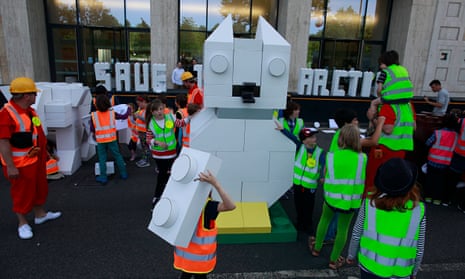I‘ve been watching with interest as Lego struggles under the spotlight of Greenpeace’s latest campaign. Alongside three-quarters of a million petition signatories, the environmental campaign group is calling on Lego to drop its line of Shell-branded cars and quit endorsing Shell for good. A co-promotion with Lego is a lucrative PR stunt for Shell. But as Greenpeace is keen to point out, Shell is an appalling choice of partner, not least because of its controversial plans to extract oil from under the melting Arctic region.
Lego was formed in the 1930s by philanthropist Ole Kirk Kristiansen. His vision was to make it a stalwart cultivator of creative play and contribute to healthy child development. This idea was enshrined within the company. Even Lego’s name translated from Danish means “play well”.
Play is children’s inbuilt learning drive. It’s the natural desire of a young human being to explore, experiment, build and imagine. It’s how children learn about the world and how to thrive in it. Since much play is social, it’s also where they learn how to get along with each other, refining their powers of empathy.
Play, science tells us, is as important to child development as food and sleep. So important, in fact, that it has been recognised as a child’s fundamental right by the United Nations (article 31 of Unicef’s convention on the rights of the child).
But over the last few decades child’s play has been turned into big business. Marketers have learned how to exploit children’s emotional vulnerabilities in the name of profit. Instead of toys that benefit children, the industry has focused on creating quick-fix fun that makes money for shareholders. As a result, research tells us, modern children find it harder to maintain concentration, self-regulate behaviour and develop appropriate levels of empathy.
As a specialist in child development, I’ve had growing concerns that now even Lego has lost its way. Its new products veer further away from its innocent beginnings. Increasingly Lego churns out lucrative but unimaginative lines of “must-have” sets to promote new movies, games and videos. These little boxes, which come with instructive pictures on the front, unlike the traditional Lego bricks, do not result in child-directed, open-ended “real play”. They do not promote imagination; they stifle it. They do not allow children to be creative and learn to think for themselves; they tell children what to think, instilling consumerist values that risk increasing rates of stress for parents and children alike.
Lego’s recent misadventure in a line of sets “for girls” has come in for pronounced criticism. These sets, which include a pretty pink shopping mall and model catwalk, reinforce harmful gender stereotypes, as pointed out by an insightful seven-year-old girl.
So while Lego’s change in attitude meant it rose this year to become the world’s biggest toy company, it comes at a great cost to children.
Greenpeace’s campaign urges Lego to stop promoting Shell, and instead stand up for the Arctic and protect the planet for future generations. But it also raises questions about Lego’s responsibility to protect children here and now from harmful and cynical marketing ploys, and the growing trend towards toys that limit child development. By creating Shell sets, Lego is allowing a controversial multinational to misuse its trusted brand to advertise to children and employ “pester power”. On top of that, Shell is a company whose interests lie in direct contrast to children’s, embroiled on the wrong side of the struggle to limit global warming and prevent its worst impacts.
In Quebec, Sweden and Norway, advertising to children under the age of 12 is banned. Here in the UK, despite strict rules controlling advertising of age-restricted products, fast food and sugary drinks, children are still subjected to a daily torrent of corporate messages. That a petrol brand, despite also being an age-restricted product, has made it on to a popular children’s toy is scandalous.
Lego is trusted by parents because most will have played with it themselves as children. But it is now abusing this trust by putting profit above the core values of real play from which it originated. If Lego wishes to retain its reputation as a bastion of children’s interests and “playing well”, then it must be faithful to its roots. It must return to putting child development at the core of its toys; not just the core of its corporate communications.



